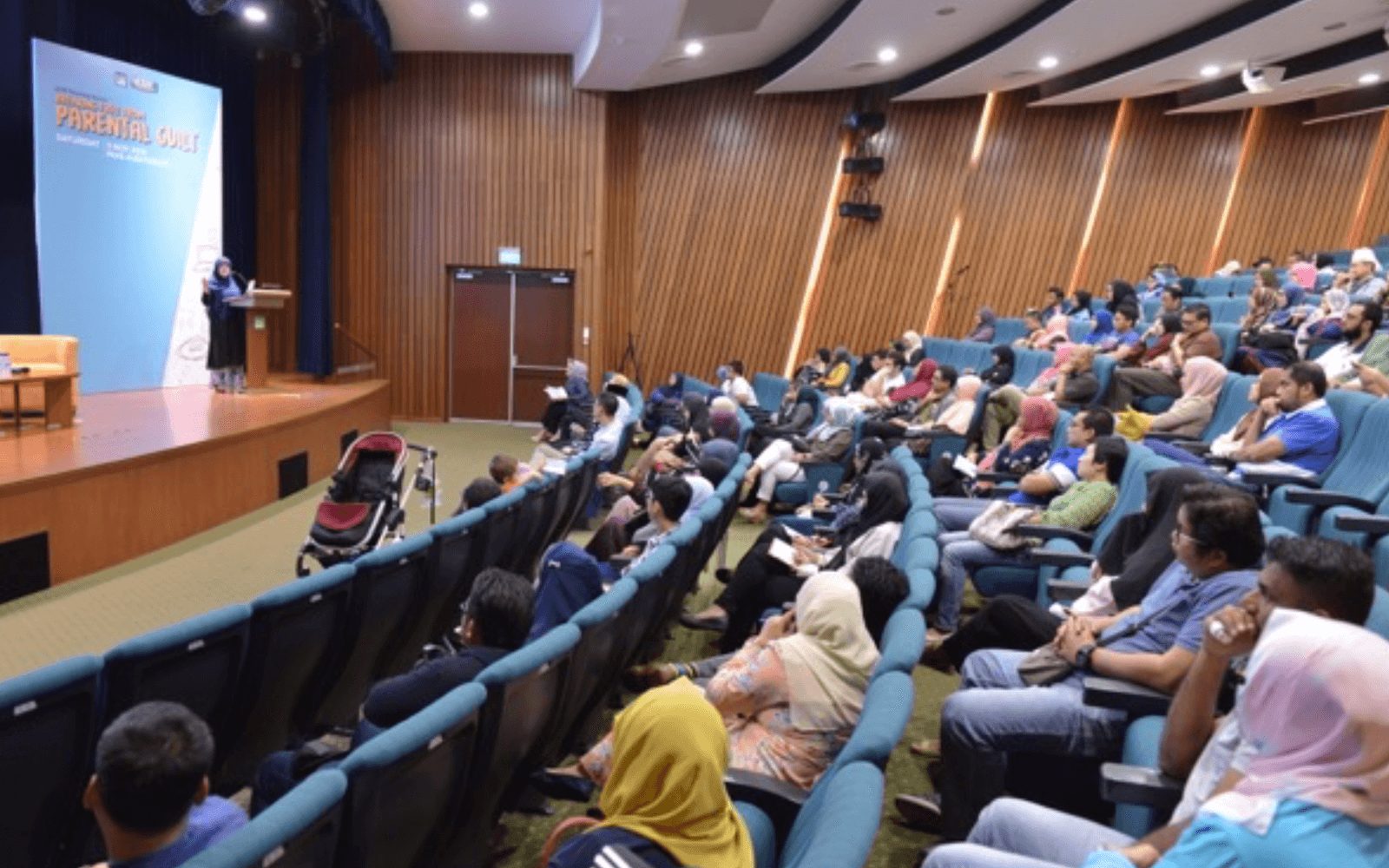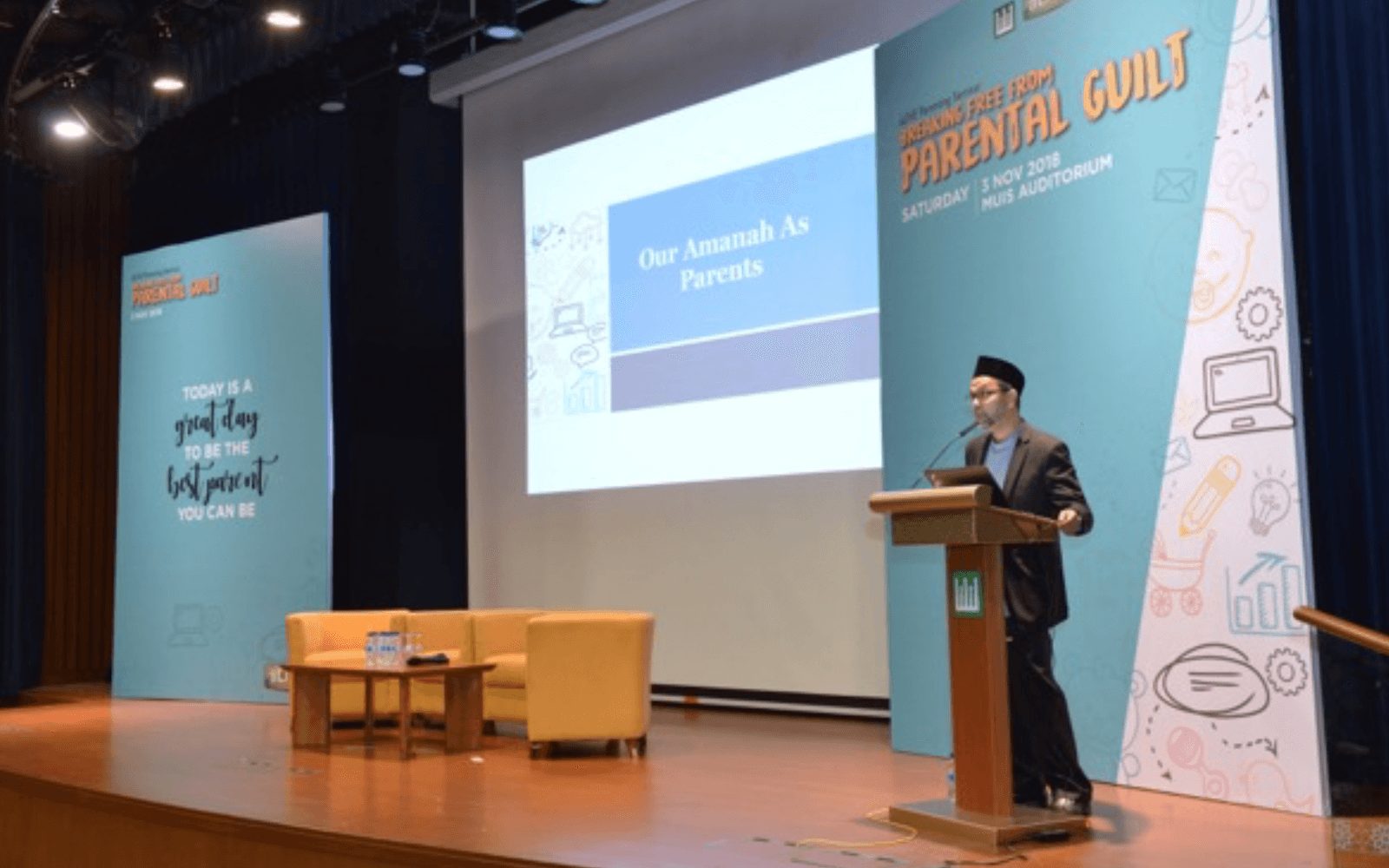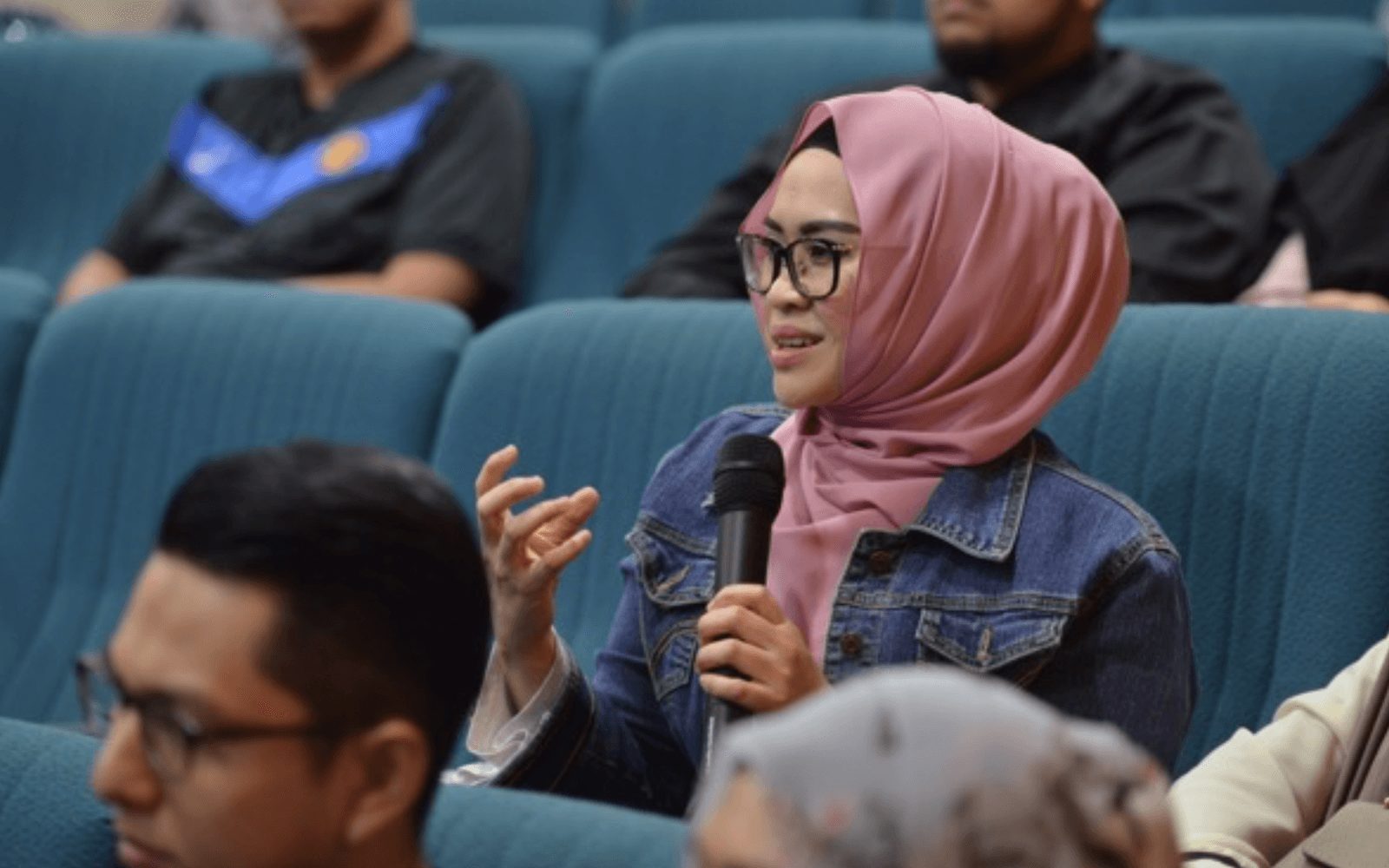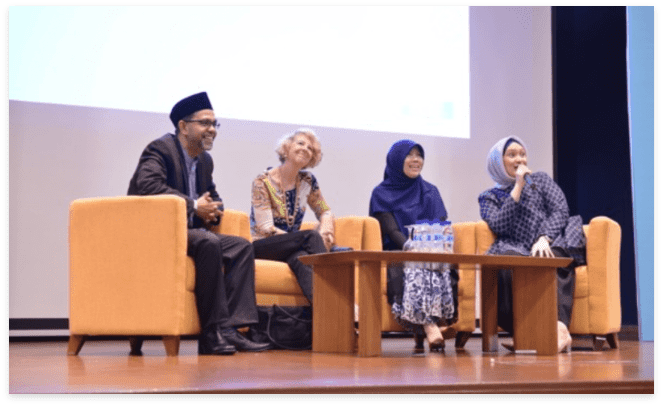Radhiatul Mardhiyah Mustaffa
Freelance Writer
Senior Early Childhood Educator & Parent
In the name of Allah the most Kind and the most merciful, Parenting.
I never thought that I would be worrying about it one day. I used to think my life would never be stressful because I made the conscious decision to stay single and constantly be the third wheel for my parents until the day I pass on… until I met my husband and got married, and along came little, sweet baby A.
I used to obsessively search Google on how best to parent my baby. Now that he’s past one year old and starting to show signs of his own egocentrism and preferences (which sometimes does not sync with mine), I have become desperate for tips on how to discipline my child without making my child hate me.
So when I got asked to help review this seminar, I jumped at the chance to learn.
Here we go!

Topic 1: Disciplining without guilt by Ms Katy Harris, Behavioural Therapist, Family S.O.S
Ms Katy opened her session with a comparison of two policemen. One in a place where traffic was crazy and in complete disarray, with this policeman screaming & shouting in vain efforts to organise the mess. People were not even paying attention to him despite his valiant screaming to attain their attention.
The other policeman was at a calm road. Where traffic was orderly and parking was neat. The policeman here was calm and collected but people knew that should they break the traffic rules, they would be fined.
This depicted two various ways that disciplining a child/children could go. There would be parents who feel the need to scream at everything and after a while the child learns to ignore it. Instead, Ms Katy suggested that we emulate the calm policeman in which our children know the rules and consequences because of our consistency in reactions to them.
To discipline is a disciplined process. It requires planning and checking in with your spouse to ensure that it goes smooth-sailing and that challenges will be met with kindness, resilience and self-compassion. In this day and age, we seldom have a lot of time on our hands while juggling a career and family commitments. Most parents (like me) are parenting on the fly. We take steps to deal with problems that are in front of us and that alone leave us exhausted to think of how to prevent future occurrences.
Ms Katy emphasised that time must be made to plan our parenting. We are going to be parents for a long time, insyaAllah. Hence if planning is made for events that span a few days or hours, parenting planning needs to be at the top of the list.
The audience was made to ponder on whether they wanted to raise children that required to be told or children that would grow up into people that have consciousness of their actions and consequences. This would result in highly independent and confident children. They are given space to think about the issues that surround them and learn to problem solve.
Honestly at this point, I felt like I was back in one of my lectures while taking my degree in Early Childhood Education. It was a huge wake-up call because some of the knowledge weren’t new to me but I just didn’t put it into practice when faced with my own child!
In parenting, like every situation we face, there will be problems. However, Ms Katy pointed out that problems have a spectrum of severity. Small problems are not worth getting bothered about. These are things that are silly but keep occurring repeatedly. Ms Katy gave an example of a mother tripping over a school bag every day. Instead of keeping the bag for her child, she could try something that would make the child think about the consequences of leaving his bag out. She could maybe keep the bag in her room and wait for him to look for it. Or she could also ask him to think about what he wants to do with the bag whether or not he should keep it or leave it lying around.
Giving ultimatums can be used but should be as a very last resort. Children should know what the results are for their actions, and when they know, they would make a conscious effort to ensure that their actions only reap positive consequences.
Being self-compassionate is also crucial in parenting. Often times parents feel guilty for punishing or disciplining a child. Therefore Ms Katy stressed that not all of the children’s problems need to be picked up and responded to. Parents have the option of giving the problem back to the child, give them space and trust that you can guide them to solve it. Being self-compassionate also includes telling them how you feel about the situation. However, it is important that anger is not the only emotion shared.
Lastly, Ms Katy reminded the parents to role model explaining instead of complaining. Avoid playing the blame game and the children will follow.
Topic 2: The Working Mum and Dad Guilt by Ms Muzaiyanah Hamzah, Head of Social Development Policy, MUIS
As a working parent, this is the topic I was most excited about. I’m sure my fellow working parents feel the same about not spending enough time with your child/children. However, we all have bills to pay and working helps our family lead a more comfortable life.
Ms Muzaiyanah then questioned, what is a comfortable life?
That question must be asked and discussed between a family so as to set goals and strive to attain it. This is so that we do not lose sight of what we are striving to achieve.
The society has a culture of guilt. In any situation if there is an opportunity for guilt to creep into our hearts, it will. Most times it’s silly but I know that even that smallest sliver of guilt can make some of us (me) not function properly. Ms Muzaiyanah then emphasised that we should recognise the source of the guilt and understand that most times it does not matter. Hence remove it from your heart.
She mentioned a point supporting the first speaker that parenting requires planning. Ms Muzaiyanah gave an example of how she and her spouse would “check in” every anniversary to remind and determine where they are at their parenting for each of their children. They then set goals (other than academics) for themselves to help their children achieve. This is something do-able for most couples and it could be a starting point for smarter parenting along the way.
Also echoing Ms Katy Harris, Ms Muzaiyanah emphasised letting your children have some space to think and make decisions on their own. Be there to guide them but let them see the consequences of their choices. This would help in building their independence and resilience in the future.
The key to parenting is also being aligned with your spouse. Do not sabotage one another in efforts to play good cop bad cop. This would result in a child that knows how to manipulate people to get what they want. Parenting cannot be done in a “agree to disagree” light. Spouses must compromise and come to a mutual decision.
It is also crucial for parents to understand that being there for your child requires you to fill your own bucket with strength and clarity. Hence should any parent need help, professional or from family/friends, they should not hesitate to ask. Ms Muzaiyanah emphasised that seeking help is not a sign of weakness. It is one of extreme awareness.
Topic 3: Lessons from the Qur’an and Sunnah For a Guilt-Free Parenting Lifestyle by Ustaz Syed Mustafa Alsagoff, Principal Madrasah Alsagoff Al-Arabiah


Ustaz Syed Mustafa began with a hadeeth that specified that each of us is a shepherd and that we would all be responsible for the ones under our care. Naturally as parents, our children fall into that category. It was specified that children need to be cared for physically, intellectually and also spiritually/morally. Hence it is the duty of parents to ensure that all these needs are met. Should for any reason we cannot fulfil them, we need to find or hire people that can help meet the needs stated.
Ustaz mentioned that as fathers, the care of the children falls into the responsibility that they carry. So much so that if the mother of his child breastfeeds their baby, he has to pay her for the effort and the milk that she gives as sustenance to the baby unless of course the mother regards it as sadaqah from the kindness of her heart. I was not aware of this, and when I heard that, my heart just swelled with joy and a kind of warmth emanated through myself.
As a new mother, I had breastfed my baby for only 6 and a half months. I know first hand that it was a difficult journey. So many factors affected my milk supply and the constant demand for my baby’s feeding left me exhausted and with my back so sore as I slept sitting upright to ensure my baby was satiated. The fact that Allah is so kind, so sweet that He made our efforts rewardable not only in the hereafter insyaAllah but also by our spouses. How sweet masyaAllah, masyaAllah. So remember mummies…you can start charging for the milk
On the subject of milk, our children are born as pure and white as a blank slate. It is up to us as parents to mould them and help them to internalise the teachings of Islam. As a preschool teacher I have often wondered the right balance we should give children. Forcing the religion on them would not be ideal as it might push them far away from it when they have the chance to do so. However as parents, we also have a responsibility that we need to instil in our offspring the teachings of Islam.
This is where we are given a sort of timeline. If our children do not pray by the age of seven, we can reprimand and remind them. Therefore, the spiritual preparations has to begin from day 1. By slowly inculcating in them the importance of certain beliefs and rituals through role modelling and routinely in daily activities, insyaAllah the children would be able to follow.
With all the knowledge in the world that we want for our children to know, Ustaz emphasised that not all knowledges are appropriate to teach children. He reminded us to give them ‘Ilm Haal. This refers to the knowledge that they need to know in their lives. Therefore relevance is a key aspect in this matter. Teaching children anything and everything would not guarantee the relevance and usefulness of the knowledge. Teaching them things relevant to their lives would result in more efficient usage of the information.
To avoid guilt and stress in parenting, Ustaz reminded us to go by these three steps: Feel, Check & Connect.
When we feel the guilt or any negative emotion, recognise the source and check how we can overcome it. Connect back to Allah and remember that He knows best. Further, seek forgiveness in Him as His Rahmah is wider than His anger. As long as we know as parents that we tried our best, insyaAllah our children will benefit.
To close his session, Ustaz reminded us to always du’a and ask Allah for guidance.
Q & A Session
After the three speakers had shared, some questions were asked.


Have our parenting caused this “strawberry” generation syndrome where the children are not resilient and give up easily?
Ms Muzaiyanah mentioned that it is a question of how parents deal with and balance the experiences that the children have had. Ms Katy stressed that although our children seem indulgent, they experience different struggles. And as parents we have to recognise that there is strength in their struggles. Ustaz added on that we need to teach them to appreciate what they have and to face the challenges that come upon them. Give them knowledge that they can use to guide them through.
How do parents increase in patience?
Ms Katy reminded us that no family was built without anger. That anger showed that people cared about one another. Fights that occur show that each one wanted their version of what is best for the family. Hence it is not realistic to expect no fights or tantrums. The key focus should be the connection that comes afterwards. It is okay to lose patience sometimes but know when is the time to take a break.
Ms Muzaiyanah echoed the sentiments and emphasised the need for time-out for parents in the face of overwhelming challenges.
How do we stop sibling rivalry?
Ms Katy mentioned that sibling rivalry will always exist. Talking to your children about it would be a good start in managing it. Ms Muzaiyanah gave examples of ensuring every child feels special. She mentioned how spending individual time with each of the children at different times could help them. Ustaz rounded up the answer by encouraging parents to talk to their children about fairness not always equating to equality. Fairness is giving each child what they need at the point of time they are in.
In Summary
Overall, I learnt a lot from the sharing. It has helped me see what are things that I can improve on in my parenting. It has also provided me with a sense of comfort knowing that all parents struggle and need help in their journey to be the best that they can be for their child. Has the session made me feel less guilty about parenting? Not really. But it has helped me to think about the things that I do and who and what I do it for. This would definitely help in strengthening my resolve in doing what is right no matter how guilty I feel.
The session was informative and delivered in an easy manner to digest. The speakers’ wisdom and knowledge shone through and the audience were kept attentive with real life examples and stories. Alhamdulillah for the chance to attend it. May Allah keep us steadfast in the journey of becoming good parents insyaAllah.
“aLIVE Parenting Seminar 2018: Breaking Free from Parental Guilt” was held on 3 Nov 2018, and was organised by the Youth and Community Education Strategic Unit, Majlis Ugama Islam Singapura (Muis).






